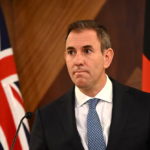The nanny state and class war
These are interesting times in Australian politics, as the Chinese might say.
Have you noticed that the very same people who decry the nanny state are simultaneously arguing that the state, meaning we – the taxpayers, should subsidise the lifestyle of people who are earning 2.5 times average weekly earnings?
You have not noticed? I suggest that you should, because this kind of Orwellian doublespeak could cost you a lot of money and result in cuts to government services so that the middle middle class can continue to live comfortably – at our expense.
And have you noticed that the same people also argue against political correctness, while they are busy spinning a whole new vocabulary of political terms intended to put debate in a straitjacket, again bringing 1984 to life.
According to twenty-first century doublespeak: refugees are illegal immigrants, building new education facilities is a waste of money…while subsidising private health insurance and private schools is a wise use of public funds, government debt is bad ( even though a small amount of debt now can prevent a whole lot more government – and private – debt later), and the government must not cut support for families – while it must make more severe cuts to spending.
Oh, and cutting middle class welfare is tantamount to fighting a class war. There is more; but I think you can see what I mean.
Of course, we should not be surprised that Abbott, Hockey and co. should support subsidising the rich while taking away from the poor. They are the very same people who presided over the transformation of the federal public service into a bloated, top heavy and wasteful bureaucracy, whose main role was to come up with new ways to squander billions on bribes and sweeteners to buy votes from the middle classes.
I worked for federal governments from 1976 onwards, from Fraser to Rudd, and over three decades I saw the public service slowly become more efficient and professional…until the second half of the Howard Government when billions of dollars were wasted by incompetent ministers aided and abetted by timid public servants.
During those years, the notion of savings options disappeared from the public service lexicon and ministers were allowed to spend as they wished.
Here are a few examples: chaplains in schools, the Access Card, information technology projects that blew their budgets and delivered little or nothing in return – over and over again, defence spending out of control – as the services competed to buy more and more toys we do not need to defend ourselves, the senior executive service grew and grew and agencies were encouraged to compete with each other to pay more and more to steal staff from one another.
The list goes on, but I do not want to bore you.
And Abbott, Hockey and co. now say that government spending and public service numbers are out of control. I prefer to judge actions, rather than words and their actions in government speak volumes. Elect Abbott and the budget will be out of control, in the hands of ministers who understand nothing of economics.
Of course, the Rudd/Gillard governments are not without blame.
Not enough has been done to restore discipline in public sector spending and our dollars continue to be wasted to support chaplains in schools, private health care, new submarines and joint strike fighters that we do not need, and many other Howard Government legacies that should be dispensed with as soon as possible.
Nor has enough has been done to teach public servants how to design and manage large scale programs and how to manage billions of dollars of government procurement effectively.
There are ways to manage the business of government efficiently and effectively and the Hawke/Keating governments, as well as the first Howard government knew those ways and practised them. But since then we seem to have entered a realm where the blind do indeed lead the blind, at our expense.
Next week we will see how we can get back to basics and start sorting out what is value for money and what is not.
Patrick Callioni is a former senior public servant, with the Queensland and Australian Governments, and is now the Senior Executive Advisor, Domestic and International Markets, with the Sustain Group www.sustaingroup.net. His books Compliance and Regulation in the Financial Services Industry & Waves of Change: Managing Global Trends in the Financial Services Industry are available at Amazon













